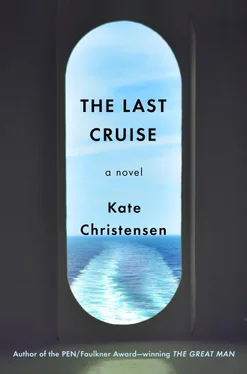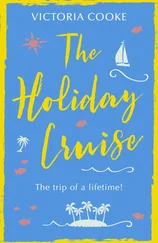Feeling lighthearted at the prospect of a night alone in her own bed in her own room, Christine got up, slid her feet back into her shoes, and headed back along the path, toward the music, the dancing babies, the lights.
The nonstop El Al flight from Tel Aviv to Los Angeles took fifteen hours and landed on the same day it left. During that entire day, as the plane followed its imaginary dotted line across the globe to crackling, tinny music (Miriam still thought in old newsreel images even though the last one she’d seen in a theater had been sometime in the 1950s), she worried about her violin, which was securely tucked overhead in its Bobelock crescent case with its strings properly loosened.
Miriam worried about her violin actively, as she would worry about a dog or a small child that might start whining or need its diaper changed. She tried to sleep for a few hours with her head smooshed on a little pillow against the window, but her body could never get comfortable on a plane. She found that if she didn’t keep things moving, it all tightened up and ached.
Also, Isaac, her ex-husband, sitting next to her in the middle seat, was snoring. They had both grown up in the United States and emigrated to Israel in the mid-1960s. There, they had met as soldiers during the Six-Day War, in 1967, and had been married from 1971 until the late 1990s; it was hard for her to pinpoint when or why, exactly, the marriage had ended. They had finally gotten around to finalizing their divorce sometime later; again, the exact date eluded her, maybe because it didn’t matter, in the end, since neither of them had ever remarried. Their passports proved that she and Isaac still shared a last name, his family’s: Koslow. It was so close to Miriam’s family name, Kosner, she hadn’t seen the point in changing it back.
They even lived in the same Tel Aviv high-rise building, which wasn’t exactly an old-age home, or even assisted living, but it was chock-full of old people, and there were nurses and doctors on staff and a dining room on the mezzanine that served kosher food soft enough for the toothless and bland enough for the dyspeptic. Isaac’s larger apartment had a view of the Mediterranean, while Miriam, who lived on a lower floor, had a view of an unremarkable section of downtown Tel Aviv. Isaac was richer than Miriam because of a family inheritance, and she hadn’t taken any of it in the divorce. All she had was what she made, performing with the Sabra String Quartet, which she and Isaac had formed in 1975 with Sasha Spektor and Jakov Strauss, and giving violin lessons. She couldn’t afford to retire; not yet, anyway. Sometimes she thought about just moving in with Isaac and selling her place, not that he had offered that as a solution, but she was fairly certain she could bully him into it. So far, she had been able to keep going without resorting to that, but it was her backup plan in case her savings weren’t enough when she got too decrepit to play music anymore. The Sabra Quartet had been performing together for more than forty years and was starting to fray around the edges: they were all getting old. They were in their last years together. They all knew it.
And yet here they were again, on yet another long plane ride, flying halfway around the world to play for their billionaire friends and benefactors, Larry and Rivka Weiss, on their two-week cruise to Hawaii. Miriam couldn’t wait until the whole thing was over and she could be home again.
The stewardess, who had been working her way down the aisle with the drinks cart, had almost reached her row. “Stewardess” was the wrong word now. Flight attendants, you were meant to call them. Language was always changing, both English and Hebrew, and it was sometimes impossible to keep up. Everything was so politically correct now. Everyone was so sensitive. And being bilingual made it more complicated. Miriam didn’t mean to screw up, she just couldn’t help it. She had to tell herself not to say “schwartze” and “faygala” anymore, but sometimes she forgot.
The stewardess was smiling at Miriam, her head cocked with inquisitive politeness, as if she’d just shouted a question at a daft person, which she probably had. She was a gorgeous young thing, an olive-skinned, sloe-eyed Sabra with raven hair and lush lips. They were a dime a dozen in Israel, but it didn’t make them any less appealing. Miriam thought they were the most beautiful women in the world.
“Tomato juice, please,” said Miriam in Hebrew. “With some vodka on the side. I’d like Smirnoff if you have it.”
“Bloody Mary mix?” the girl asked. “It’s kosher.”
“No!” Miriam said, in English now. “I hate that stuff, ecch, celery salt. Straight tomato juice. Kosher, I don’t care about. Do you have any plain potato chips?”
“The snacks cart is right behind me,” said the girl.
Isaac was awake and awaiting his turn to order. The sound of him drawing in his breath with a slight wet catch in his throat caused Miriam to clench her jaw and dig a fingernail into her palm. She had known this man almost her entire life and she had wanted to strangle or eviscerate him so many times, she no longer even noticed the urge when it came upon her.
Of course he was going to ask for a seltzer.
“Seltzer, please,” he said in English. Isaac had never quite gotten the hang of Hebrew, even after all these decades, although he spoke it well enough when he had to. Miriam knew how proud he was; it made him insecure not to speak a language other than his native one, even though all the newly arrived Israelis of their generation had learned it together from scratch in the ulpanim. “Can I have the whole can?”
As the jet thrummed through the thin, high altitudes above the earth, they drank their beverages side by side, Isaac taking little sips of his, Miriam slugs of hers. The carbonation made his nose twitch. The vodka entered her bloodstream and made her feel fiery and young again. She crunched her potato chips. He sniffed, nibbled at his chocolate chip cookie. She closed her eyes and hummed, very lightly, her second-violin part to one of Schubert’s slow movements, she couldn’t remember which one right now. She could feel Isaac there next to her like a part of herself. Divorced or not, she knew that he was envious of her cocktail. He was allergic to liquor. It inflamed his cheeks and made him nauseated. One sip was enough. He’d been a great pothead in his day, but his lungs were too old now to tolerate it, so he ate it baked into sweets, which he loved.
On the plane, in the row behind them, sat the quartet’s other half with Jakov’s cello in the middle seat between them. Sasha, the first violinist, was drinking black coffee. Jakov was drinking red wine. They were an interesting pair: Sasha looked like a swarthy hawk with his strong tall body and sharp short hawk’s beak of a nose and Russian black eyes and black-and-white wavy hair that hadn’t thinned with age. Jakov the Lion’s former wild mane of ginger curls had faded to a fluffy white-gold, but his face was still cherubic and catlike with pouting lips and slanted gold-green eyes. Miriam still thought both men were nice to look at, and for a while, way back when, she’d yearned to schtup them both. Not at the same time, necessarily; or maybe at the same time, sure, why not, since it was all purely hypothetical and always would be.
Really, Sasha was the one she’d always had a crush on, for as long as she’d known him. Once, fifteen years ago, during the slow movement of Schubert’s Rosamunde Quartet, she and Sasha, side by side on their violins, had shared an interval of soulful communion with the music and each other. She was stirred for days afterward, all fluttery around him. He was the same around her, too, but they hadn’t dared act on any of these feelings. Never mind that he was married. This was separate from that. This was music, this was work, this was their shared livelihood. And Isaac. They couldn’t do that to Isaac. It would destroy the quartet. Besides, playing music together was sexy enough, most of the time. Except of course when there was squabbling or discord, which happened frequently, as it did in any family. The quartet was like a four-way marriage, she sometimes thought. But all this time, secretly, Sasha had been the one she wanted to be married to, for real. And she’d always suspected he felt the same about her.
Читать дальше












